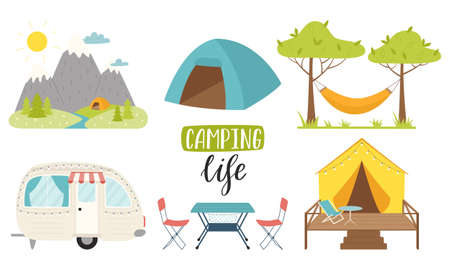Choosing Your Destination
Embarking on a car-free camping adventure across the British Isles begins with picking the perfect destination that’s both accessible and captivating. Fortunately, the UK is dotted with stunning national parks, winding coastal paths, and family-friendly campsites that can be reached by train, coach, or even ferry. Consider exploring the Lake District, where scenic villages like Windermere or Keswick are just a train ride away and offer easy access to lakeside campsites. If you fancy sea views and fresh air, the South West Coast Path in Cornwall presents opportunities to pitch your tent near dramatic cliffs and sandy beaches, all within walking distance from bus stops. For families, places like the New Forest provide gentle trails and well-equipped sites, just a short hop from mainline rail stations. Remember to check campsite facilities—some offer pre-pitched tents or glamping pods for added convenience when travelling without a car. By choosing destinations linked by public transport, you’ll not only reduce your carbon footprint but also enjoy a more relaxed journey together as a family, soaking up the changing landscapes through the window before your adventure even begins.
2. Getting There by Public Transport
One of the best ways to embark on a car-free camping adventure across the British Isles is by embracing the country’s well-connected and reliable public transport system. Not only does this reduce your carbon footprint, but it also offers a relaxed and scenic start to your family camping trip. Before setting off, it’s important to plan your journey carefully, combining trains, coaches, and local buses to reach even the most tucked-away camping spots.
Planning Your Route
Begin by identifying your chosen campsite and the nearest town or village with public transport links. The National Rail network connects major cities and towns throughout England, Scotland, and Wales, while regional coach services fill in gaps between railway stations and rural destinations. Local buses can then take you the final stretch.
Handy Resources for Journey Planning
| Resource | Usefulness |
|---|---|
| National Rail Enquiries | Find train times, fares, and connections nationwide |
| Traveline | Plan journeys combining buses, trains, trams, and ferries across the UK |
| National Express & Megabus | Book affordable intercity coach travel to many rural areas |
| Local Bus Operators (e.g., Stagecoach, Arriva) | Access routes from market towns to countryside campsites |
Top Tips for Stress-Free Travel
- Book train tickets in advance for the best prices—many operators offer family-friendly fares and railcards.
- If travelling with little ones, check timetables for less crowded off-peak services.
- Allow extra time for connections between different types of transport.
- If your campsite is a walk from the bus stop or station, pack lightweight gear or consider pre-booking a local taxi for the final mile.
This gentle approach not only makes for an enjoyable start to your holiday but also encourages children to appreciate the adventure of journeying together through Britain’s beautiful countryside without relying on a car.

3. Essential Packing for Car-Free Camping
When setting off on a car-free camping adventure across the British Isles, packing can feel like solving a fun family puzzle. The golden rule is to pack light but smart—imagine everyone helping to carry just what’s needed so your journey stays joyful and stress-free! For families, start by making a checklist of essentials. Each person should have a sturdy rucksack that fits comfortably, and inside, focus on layering clothes for unpredictable British weather. Think waterproofs, warm jumpers, and quick-drying trousers—after all, you might be paddling in puddles one moment and basking in sunshine the next! Choose easy-to-carry tents or pop-up shelters that won’t weigh anyone down on those scenic train rides or woodland walks. When it comes to sleeping gear, lightweight sleeping bags and roll mats are best; bonus points if children help choose their own colourful versions! Don’t forget a compact picnic set, reusable water bottles, and simple snacks like oat bars or apples for energy boosts along the way. And of course, tuck in family favourites: a deck of cards or a much-loved storybook for cosy evenings under canvas. With a bit of thoughtful preparation and everyone pitching in, you’ll find that packing becomes part of the adventure—making each family member feel included and excited for the journey ahead.
4. Navigating the Countryside
Exploring the British Isles without a car is a wonderful way to connect with nature and embrace the slower pace of rural life. However, navigating the countryside can feel daunting if you’re not familiar with local maps, footpaths, or access rules. Here are some reassuring tips to help your family adventure run smoothly and safely.
Using Ordnance Survey Maps
Ordnance Survey (OS) maps are a camper’s best friend. These detailed maps show everything from public footpaths and bridleways to campsites and historical landmarks. Before you set off, pick up an OS Explorer map for your chosen area—these are available at bookshops, outdoor stores, or as handy apps on your phone. Familiarise yourself with the legend so you can spot key features like woodland, rivers, or elevation changes.
| Map Type | Best For | Where to Get It |
|---|---|---|
| OS Explorer | Walking & Camping | Bookshops, Outdoor Stores, Mobile App |
| Landranger | Cycling & Driving | Bookshops, Online Retailers |
| Digital OS Maps | On-the-go Navigation | Ordnance Survey App/Website |
Following Public Footpaths
The UK has thousands of miles of public rights of way—footpaths, bridleways and byways—that crisscross countryside and connect villages. Look for waymarkers: yellow arrows for footpaths, blue for bridleways, and red for byways. Always stick to marked paths to protect wildlife and respect farmland. If you come across a stile or kissing gate, it’s a clear sign you’re on a public route.
Tips for Walking Safely:
- Wear sturdy shoes and bring waterproofs—it’s Britain after all!
- If you open a gate, close it behind you.
- Avoid walking through fields with livestock if possible.
- Take extra care when crossing minor roads or railway lines.
- Leave no trace—carry all litter home.
Understanding Local Access Rights
The Countryside and Rights of Way Act (CRoW) gives everyone the right to roam in designated open access land in England and Wales, such as mountains, moors, heaths, and downs. Scotland’s “right to roam” laws are even more generous. Still, it’s important to know where you can go—and where you can’t—to ensure a safe and friendly experience for everyone.
| Nation/Region | Main Access Rights | Notes |
|---|---|---|
| England & Wales | Access Land + Public Paths | No camping without permission unless in designated areas. |
| Scotland | Right to Roam (Land Reform Act) | You may camp responsibly almost anywhere except near homes or schools. |
| Northern Ireland | Limited Public Access Paths | Campsites recommended; less open access land. |
Your Family Adventure Awaits!
Navigating the British countryside is part of the fun and learning together as a family makes every step more memorable. With a trusty OS map in hand, respect for local access rights, and a spirit of adventure, you’ll discover hidden gems that only those travelling slowly ever find.
5. Eco-Friendly Camping Tips
When planning a car-free camping adventure across the British Isles, it’s especially important to tread lightly and protect the beautiful landscapes you’re exploring. Practising the Leave No Trace principles ensures that you not only enjoy the wild, but leave it unspoilt for future families and young adventurers. Here are some easy and reassuring ways to camp more sustainably:
Rubbish Management
Always pack reusable containers for your snacks and meals. Bring a rubbish bag so you can take all waste away with you—never leave litter behind, even biodegradable items like orange peels, as they can harm local wildlife. Many campsites provide recycling points, so sort your rubbish where possible.
Mindful Campfire Use
If fires are allowed at your campsite, use designated fire pits or bring a portable stove instead of making fires on the ground. This protects delicate plants and soil. Always keep fires small, never leave them unattended, and make sure they’re fully extinguished before heading to bed. Consider enjoying a torch-lit storytime instead—it’s just as magical!
Respect Wildlife and Local Communities
Stick to marked trails and paths to avoid disturbing natural habitats. Keep noise levels down, especially in the evenings, so both wildlife and other campers can rest easily. If you’re near a village or farmland, remember to shut gates behind you and greet locals with a friendly “hello”—a little courtesy goes a long way in the British countryside.
Eco-Friendly Gear Choices
Opt for camping gear made from sustainable materials when you can, such as bamboo utensils or recycled-fabric tents. Borrowing or renting equipment is also a brilliant way to reduce waste. Every mindful choice helps preserve these treasured outdoor spaces for generations of car-free campers to come.
Family-Friendly Activities Without a Car
One of the greatest joys of a car-free camping trip across the British Isles is discovering how much fun you can have together, right from your tent or campervan pitch. With no need for long drives or parking hassles, you and your family are free to embrace the natural world at your doorstep.
Nature Walks and Woodland Adventures
Lace up your walking boots and set off on footpaths that wind through ancient woodlands, rolling moors, or along dramatic coastal trails. Many campsites in the UK offer direct access to public rights of way—perfect for little explorers eager to spot squirrels, rabbits, or perhaps a shy deer. Bring along a pocket guide to local wildlife and see how many species you can tick off together.
Wild Swimming and Paddling
If you’re camping near a lake, river, or even one of Britain’s celebrated wild swimming spots, take advantage of a refreshing dip as a family. Always check local safety advice first, but paddling and splashing about can be magical for children and adults alike. For those not keen on swimming, stone-skimming competitions and building riverside dens provide just as much laughter.
Foraging for Nature’s Treats
Depending on the season, the hedgerows and meadows around your campsite could be brimming with blackberries, wild garlic, or sweet chestnuts. Foraging is a fantastic way to connect with nature and teach children about where food comes from. Just remember the countryside code: pick only what you can identify safely and leave plenty for wildlife and other adventurers.
Stargazing Under British Skies
As dusk falls, wrap up warm and lay out a blanket for an evening of stargazing. Far from city lights, rural campsites often boast spectacular night skies—ideal for spotting constellations like Orion or the Plough. Bring along a simple star chart or download a stargazing app before your trip for extra excitement. Sharing stories beneath the stars is a lovely way to end each day’s adventure together.
Making Memories Without Wheels
Ultimately, going car-free encourages families to slow down and fully immerse themselves in their surroundings. Whether it’s collecting pretty pebbles on a Cornish beach or listening to owls hoot in a Highland forest, these shared experiences will stay with you long after you pack away your tent. The British Isles are full of wonder waiting to be discovered—no car keys required!


